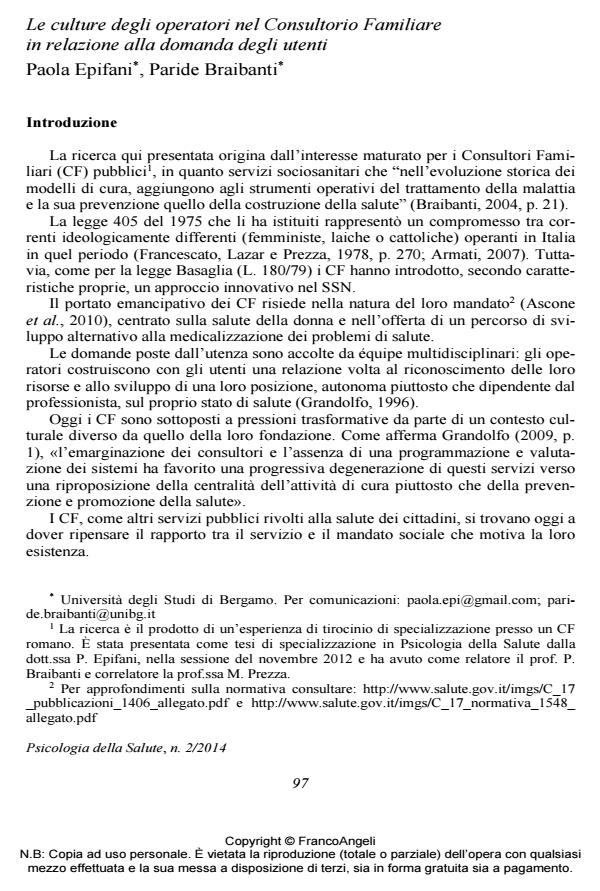The cultures of Family Planning Clinic workers regarding patient demand
Journal title PSICOLOGIA DELLA SALUTE
Author/s Paola Epifani, Paride Braibanti
Publishing Year 2014 Issue 2014/2
Language Italian Pages 23 P. 97-119 File size 258 KB
DOI 10.3280/PDS2014-002007
DOI is like a bar code for intellectual property: to have more infomation
click here
Below, you can see the article first page
If you want to buy this article in PDF format, you can do it, following the instructions to buy download credits

FrancoAngeli is member of Publishers International Linking Association, Inc (PILA), a not-for-profit association which run the CrossRef service enabling links to and from online scholarly content.
The Italian Family Planning Clinics (FPC) were born in a climate of sociopolitical renovation that lead to a rethinking of the treatment of illnesses and the development of a dialogue about health. The FPCs offer an innovative mandate focused on the promotion of women’s and family health. Today the cultural transformations that took place have induced them to rethink the relationship between service and the social mandate that motivates their existence. This intervention research is grounded on a critical health psychology approach, and originates from the assumption that the way an organization thinks of itself has a pragmatic value: it contributes to producing its own culture and orienting its actions, and thus its future. The objective of the study is to explore the cultures of FPC workers regarding their representations of patients, and the health demands that these patients raise. It intends to make these processes both visible to those who produce them and beneficial in occasions of development. 15 FPC workers of the city of Rome partecipated in the study. The research utilized a qualitative research methodology by means of focus group and text analysis. A correspondence analysis with T-Lab furnished a description of the participants’ local repertoires, showing that the connection to territory, characteristic of Italian FPCs, allows them to promptly identify cultural evolutions in patients’ demands. That is, it implies an opportunity to promote spaces of reflection focused on the worker-patient relationship, that are able to produce useful transformations for FPCs and the people who benefit from them.
Keywords: Social constructivism, critical health psychology, qualitative research, culture, woman and family health, Family Planning Clinic.
Paola Epifani, Paride Braibanti, Le culture degli operatori nel Consultorio Familiare in relazione alla domanda degli utenti in "PSICOLOGIA DELLA SALUTE" 2/2014, pp 97-119, DOI: 10.3280/PDS2014-002007